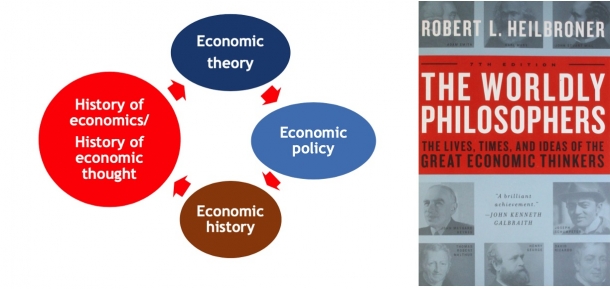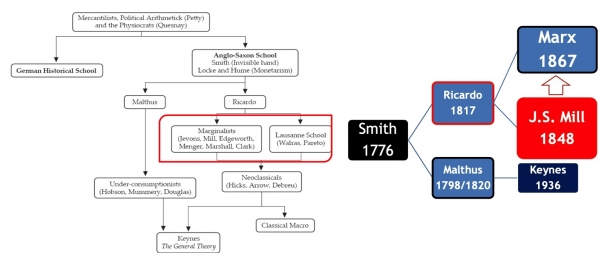History of Economic Thought I・Ⅱ
【Subjects at the School of Political Science and Economics】
Fourth-year student at the School of Political Science and Economics Siyuan Chai (Peter Chai)
 In light of the two consecutive lecture courses History of Economic Thought I and Ⅱ which I have taken throughout my third year at SPSE, I have learned extensively about the historical development of various systems of economic and social thoughts of several prominent philosophers after Adam Smith since French and Scottish Enlightenments until after the Second World War.
In light of the two consecutive lecture courses History of Economic Thought I and Ⅱ which I have taken throughout my third year at SPSE, I have learned extensively about the historical development of various systems of economic and social thoughts of several prominent philosophers after Adam Smith since French and Scottish Enlightenments until after the Second World War.
Our instructor, Prof. Tatsuya Sakamoto, a knowledgeable yet humble intellectual historian, provided well-designed lecture material, clear explanations, and open Q&A sessions, which led to a unique class format. He allowed students to freely propose their thoughts and questions on the Waseda Moodle platform after listening to each lecture, and then he selected and patiently responded to some interesting questions at the start of the next lecture. As a result, although History of Economic Thought II was delivered on-demand during the 2020 Spring Semester, everyone was able to contribute to a series of interactive discussions.
Overall, with the extra help of the designated textbook The Worldly Philosophers by Robert Heilbroner (1953), I believe that inspiring ideas which shed light on the following three distinct aspects of the learning process of History of Economic Thought were conveyed effectively by Prof. Sakamoto.
1:Social and Political Nature of Economics
Firstly, in Prof. Sakamoto’s PPT slides, he constructed and made full use of clear logical diagrams such as mind maps and spider diagrams with key points labeled to illustrate the connections between each philosopher’s concepts in focus. These summaries conveniently helped us to follow through the class contents and review them after each class.
From David Ricardo to Thomas Robert Malthus, from John Stuart Mill to Karl Marx, from John Maynard Keynes to Joseph Schumpeter, and to F. A. Hayek, intense investigations into the structures and regimes of society, notably capitalism and socialism, and roles of citizens were undertaken to different degrees, and ethical issues that are often considered central to human existence and activities including equality, justice, government policymaking and social welfare, diplomacy and international trade, colonialism and imperialism, and feminism and individual liberty were touched upon and elaborated through distinct lines of reasoning.
Therefore, the courses not only referred to Economics itself but also a variety of circumstances regarding social and political institutions, relations, and dynamics intertwined under the broad framework of “Economics,” or “Political Economy.” Accordingly, the philosophers’ analyses can hardly be understood thoroughly without understanding the pressing problems they wanted to address in their societies.

Left: History of Economic Thought among some other Economics branches
Right: Designated textbook in History of Economic Thought I and Ⅱ
2:Thinkers as Human Beings
Secondly, in Prof. Sakamoto’s explanations, he combined the philosophers’ written assumptions, hypotheses, and theories with references to their biographies and autobiographies. This approach strongly facilitated our understanding of their academic motivations and intensions based on social and political environments in history. To a large extent, the works of the thinkers reflect their interpretations of the worlds they saw and lived in and the ways they interacted with the cultures they came into contact with. Their “moral philosophies” are reflections of their personal growth both in their private spheres and public careers.
By learning about their personal experiences, we could, to some extent, identify the sources of their intellectual “appetites” and the influences of their family background, education, social network, work experience, marriage, and so on upon the processes their propositions were developed and probably changed along their life paths. John Stuart Mill’s home education and mental crisis as well as Keynes’s sexual orientation and membership in the Bloomsbury Group are examples of the roles early experiences could play upon their later public lives. Therefore, the courses not only focused on the development of the thinkers’ intellectual systems but also viewed them as individuals and human beings.

Portraits of some philosophers studied in History of Economic Thought I and Ⅱ
3:Family Tree of Thoughts
Thirdly, in our discussions, Prof. Sakamoto constantly referred back to some scholars we have previously studied. He led us to conceptualize the close historical connections between the intellectual inquiries of forerunners and posterities, which have contributed to a “family tree.” Although well-known predecessors have developed their rather innovative ideas, they have often relied upon earlier giants, such as Adam Smith, and their discourses could be traced back to similar roots.
It was easy for me to be convinced by a particular system of thought. However, when I moved on to study a later philosopher who possessed an opposing view with articulate arguments, surprisingly, I got convinced again. This puzzled and urged me to explore more deeply into the question regarding which philosopher is more realistic and impartial. I have found it difficult to provide a satisfactory answer. To me, the answer ultimately depends on, from which perspective and criteria are we evaluating the issue, and what priorities and preconditions have we supposed. Therefore, I am convinced that Economics is primarily a “social science,” so it has at least some elements of subjectivity and personal beliefs. There are probably no absolute answers nor exact and fixed interpretations.

“Family tree” of some intellectual systems of economic thought
~Cool Head, Warm Heart~
History of Economic Thought I and Ⅱ have shown us the above reasons why Economics is so challenging and profound in itself. Prof. Sakamoto has taught me the essence of logical thinking, the respect for diversity and uniqueness in thoughts, and the approach to analyzing intellectual developments through a historical point of view. Economic issues are not separable from social realities and challenges. Economic theories are in no way “cold” representations of knowledge if we truly understand the “warm” passion of the thinkers behind them, and the unique worlds they perceive through their lenses of thoughts. Prof. Sakamoto has led us to their fascinating personal and intellectual words.







